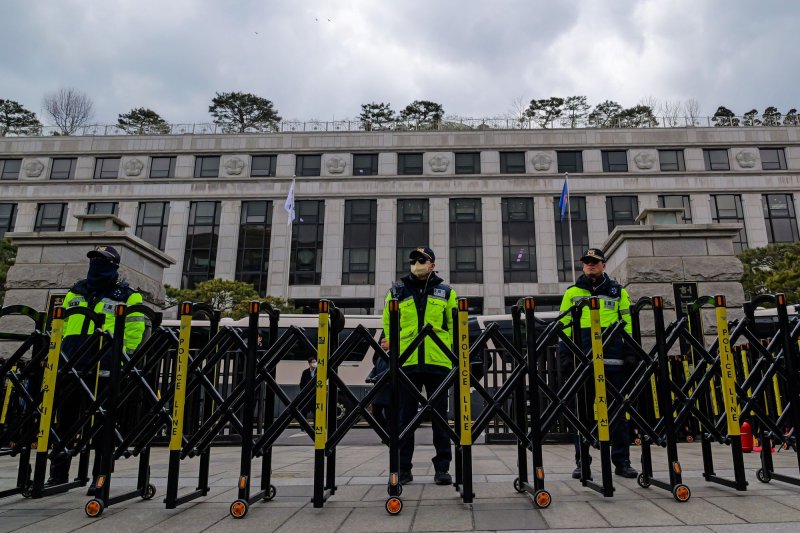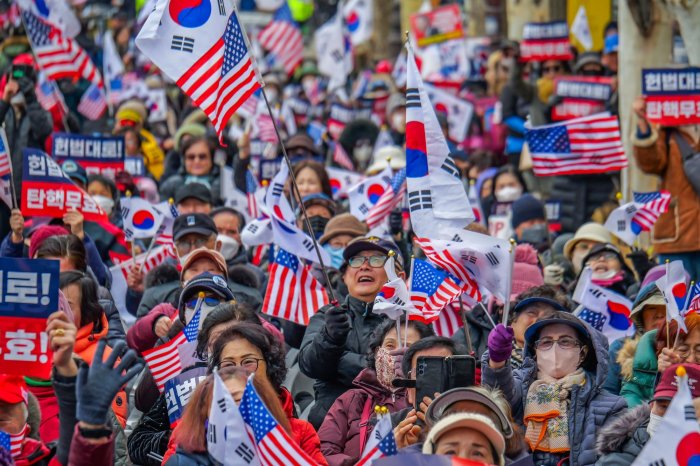1 of 8 | Impeached South Korean President Yoon Suk Yeol attended the final hearing of his impeachment trial at the Constitutional Court in Seoul on Tuesday. Photo by Thomas Maresca/UPI |
License PhotoSEOUL, Feb. 25 (UPI) — South Korean President Yoon Suk Yeol made a closing statement at his impeachment trial Tuesday, apologizing to citizens for his short-lived declaration of martial law, but he defended the move as a last-ditch attempt to save the county from the “anti-state tyranny” of the opposition Democratic Party.
Yoon arrived at the Constitutional Court in the late afternoon in a motorcade from Seoul Detention Center in Uiwang, just south of the capital, where he has been in custody since last month.
The session, which was broadcast live, featured closing arguments from Yoon’s defense and the legal team for the National Assembly, who called on the court to uphold their Dec. 14 impeachment vote.
Allowed a final statement with no time limit, Yoon spoke for 67 minutes. He apologized to citizens for causing “confusion and inconvenience” with his shocking Dec. 3 martial law declaration, but claimed he only intended it to send a message to the public.
“The declaration of martial law was a declaration that this country is in a state of national crisis,” Yoon said.
The former prosecutor cited nefarious activities from North Korean agents and blamed the opposition Democratic Party for obstructing his agenda and paralyzing the government.
“External forces infringing upon our sovereignty, including North Korea, and anti-state forces within our society are in league with each other, seriously threatening national security and continuity,” he said.
The National Assembly’s impeachment panel accused Yoon of violating the Constitution by declaring martial law in the absence of a national emergency and ignoring procedures such as notifying parliament.
“The entire nation watched the armed martial law forces’ violent acts live on television,” Democratic Party Rep. Jung Chung-rae, the head of the panel, said in his closing statement.
“President Yoon tried to destroy the Constitution and violate the National Assembly,” Jung said. “He should be dismissed for the sake of democracy and national development.”
Yoon denied that he ordered the removal or arrest of lawmakers on the night of his declaration and pointed out the brief amount of time — just two hours — that the military was deployed.
“The claim by the opposition party that I seized control of the National Assembly and attempted to start an insurrection is nothing more than a political propaganda operation,” Yoon said.
“This is truly an unprecedented fraudulent impeachment,” he added.
The 64-year-old also outlined a number of conspiracies that have animated his base of right-wing supporters, including unsubstantiated claims of election fraud.
Near the courthouse, large crowds of pro-Yoon protesters chanted for the impeachment to be dropped and held up “Stop the Steal” signs alongside South Korean and American flags.
Tuesday’s hearing was the final proceeding in the weeks-long trial. The Constitutional Court will decide whether to uphold the impeachment or reject it and return Yoon to office. A decision is widely expected by mid-March, based on the timelines of two previous impeachment proceedings.
In 2004, then-President Roh Moo-hyun was impeached by parliament, but the Constitutional Court did not back his removal. Former President Park Geun-hye was impeached and removed from power by the court in 2017. In both cases, the judges returned a decision in roughly two weeks.
If Yoon is removed, South Korea must hold a presidential election within 60 days. The president is also facing a criminal trial on charges of insurrection, which began last week.
Supporters of impeached South Korean President Yoon Suk-Yeol hold a rally near the Constitutional Court in Seoul on February 25, 2025. Photo by Thomas Maresca/UPI |
License Photo

